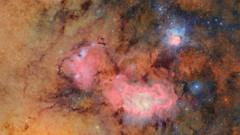The discovery reveals valuable insights into the origins of celestial objects and the potential for future asteroid threats.
**Ancient Meteorite Found in Georgia Home: A Glimpse into Pre-Earth History**

**Ancient Meteorite Found in Georgia Home: A Glimpse into Pre-Earth History**
A meteorite that crashed into a Georgia residence has been identified as older than Earth itself.
In a remarkable cosmic event, a meteorite that recently crashed through the roof of a home in McDonough, Georgia, has been determined by scientists to be older than Earth. According to NASA and researchers at the University of Georgia, the meteorite, which entered the atmosphere on June 26, is estimated to have formed approximately 4.56 billion years ago, placing its age at about 20 million years prior to the formation of our planet.
The extraordinary incident unfolded in broad daylight, capturing the attention of residents across Georgia and surrounding states, where reports of sighting a large fireball accompanied the boom of the falling rock were rampant. The meteor, which soared through the atmosphere at speeds reaching at least 1 km per second, managed to embed itself deeply into the home of a local resident in Henry County.
After the event, multiple fragments of the meteorite were carefully collected and analyzed by researchers. Scott Harris, a geologist involved in the study, confirmed that the rock was identified as a chondrite, the most common variety of stony meteorite. This finding sheds light on the meteor’s long and storied journey before finally landing in McDonough.
The homeowner, still recovering from the surprise impact, reported finding remnants of cosmic dust scattered around his property as a poignant reminder of the encounter with space. Dubbed the McDonough meteorite, this is now the 27th meteorite recovered in Georgia, highlighting an increase in meteorite sightings and recoveries in recent decades.
Harris noted the significance of modern technology and an alert public in facilitating these recoveries. He expressed hopes to publish detailed findings on the composition and movement of the meteorite to further understand the risks posed by asteroids in our vicinity. “The possibility of a large impact is always there, and we aim to prepare ourselves against such catastrophic events,” he cautioned.
The extraordinary incident unfolded in broad daylight, capturing the attention of residents across Georgia and surrounding states, where reports of sighting a large fireball accompanied the boom of the falling rock were rampant. The meteor, which soared through the atmosphere at speeds reaching at least 1 km per second, managed to embed itself deeply into the home of a local resident in Henry County.
After the event, multiple fragments of the meteorite were carefully collected and analyzed by researchers. Scott Harris, a geologist involved in the study, confirmed that the rock was identified as a chondrite, the most common variety of stony meteorite. This finding sheds light on the meteor’s long and storied journey before finally landing in McDonough.
The homeowner, still recovering from the surprise impact, reported finding remnants of cosmic dust scattered around his property as a poignant reminder of the encounter with space. Dubbed the McDonough meteorite, this is now the 27th meteorite recovered in Georgia, highlighting an increase in meteorite sightings and recoveries in recent decades.
Harris noted the significance of modern technology and an alert public in facilitating these recoveries. He expressed hopes to publish detailed findings on the composition and movement of the meteorite to further understand the risks posed by asteroids in our vicinity. “The possibility of a large impact is always there, and we aim to prepare ourselves against such catastrophic events,” he cautioned.


















